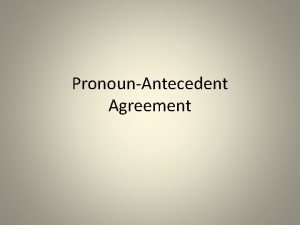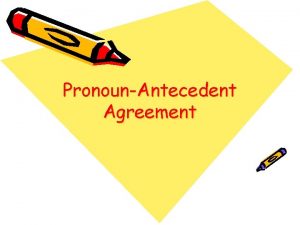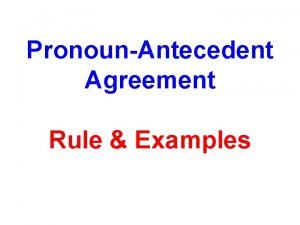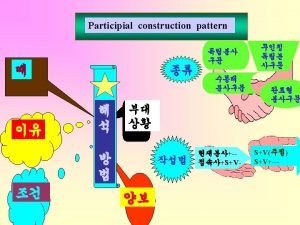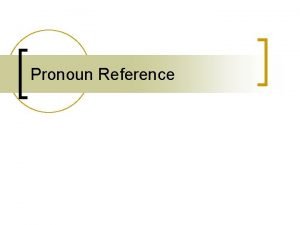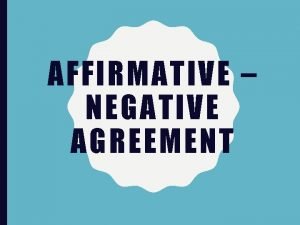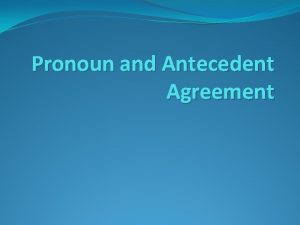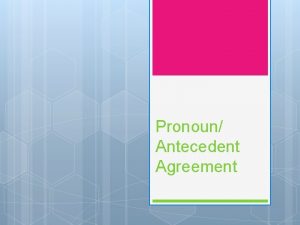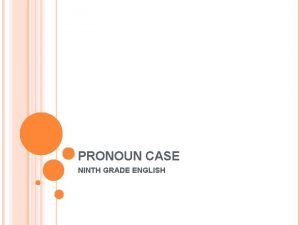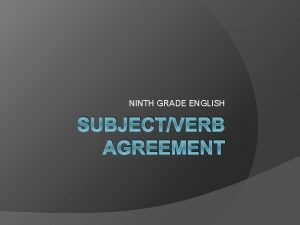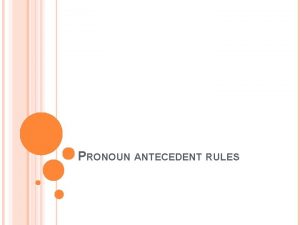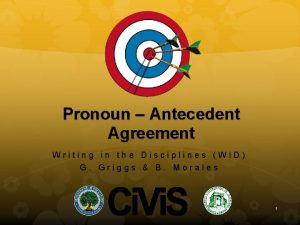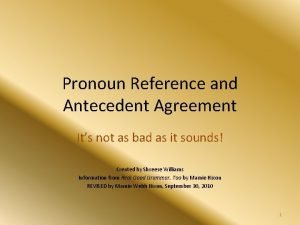Pronoun Antecedent Agreement NINTH GRADE ENGLISH Pronoun Antecedent

















- Slides: 17

Pronoun Antecedent Agreement NINTH GRADE ENGLISH

Pronoun Antecedent Agreement Pronoun—a word that takes the place of a noun or another pronoun Antecedent—the word that a pronoun takes the place of

Pronoun Antecedent Agreement Rule #1 A pronoun should always agree in gender with its antecedent. Example: Ø Carl has a new car. His parents bought it.

Pronoun Antecedent Agreement Rule #2 Use a singular pronoun to refer back to another singular antecedent Examples: Ø Ø Daniel Defoe wrote his first book at the age of 59. The elephant is long-lived animal. It grows its tusks at maturity.

Pronoun Antecedent Agreement Rule #3 Use a plural pronoun to refer to plural antecedent. Examples: Ø Ø Reliable cars make their owners happy. We walk our dogs daily.

Pronoun Antecedent Agreement Rule #4 Two or more antecedents joined by AND should be referred to by a plural pronoun. Examples: Ø Ø Sandra and Kim will bring (her, their) lunches. Alan and Michael have (his, their) books.

Pronoun Antecedent Agreement Rule #5 Two or more antecedents joined by OR or NOR should be referred to by a singular pronoun. Examples: Ø Ø Sandra or Kim will bring (her, their) lunches. Alan nor Michael have (his, their) books.

Pronoun Antecedent Agreement Rule #6 Use a singular indefinite pronoun to refer to another singular indefinite pronoun These should already be memorized from doing subject/verb agreement!

Pronoun Antecedent Agreement Singular Indefinite Pronouns Each Either Neither One Anybody Somebody Nobody Everybody Anyone Someone No one Everyone Anything Something Nothing Everything

Pronoun Antecedent Agreement Singular Indefinite Pronoun Examples Neither of the girls turned in (her, their) project. Someone brought (his or her, their) project. One of the birds escaped from (its, their) cage. Each of the baseball players has (his, their) own bat. No one on the board gave (his or her, their) decision.

Pronoun Antecedent Agreement Rule #7 Use a plural pronoun to refer to a plural indefinite pronoun These should already be memorized from doing subject/verb agreement!

Pronoun Antecedent Agreement Plural Indefinite Pronouns Both Several Few Many

Pronoun Antecedent Agreement Plural Indefinite Pronoun Examples Both of the sisters have (her, their) raincoats. Few of the kids have (his or her, their) own cars. Many of the animals have (its, their) own cages. Several of the victims lost (their, his or her) homes.

Pronoun Antecedent Agreement Rule #8 The singular OR plural indefinite pronouns can take either one. Check the meaning in the sentence to determine which one you should use. These should already be memorized from doing subject/verb agreement!

Pronoun Antecedent Agreement Singular/Plural Indefinite Pronouns All Any More Most None Some

Pronoun Antecedent Agreement Singular/Plural Ind. Pronoun Examples All of the girls will bring (her, their) favorite dessert. All of the pie is gone; (they, it) was eaten last night. Any of the parents can bring (her, their) camera. Any of the class is long. (They, it) never seems to end.

Pronoun Antecedent Agreement Singular/Plural Ind. Pronoun Examples Most of the actors know (his or her, their) lines. Most of the computer works well. (They, it) was worth the money spent. Some of the members brought (his or her, their) dues. Some of the program was lost, and (it, they) was never again located.
 Pronoun antecedent
Pronoun antecedent Pronoun definition
Pronoun definition Pronoun-antecedent agreement examples
Pronoun-antecedent agreement examples Pronoun antecedent examples
Pronoun antecedent examples Redacted meaning
Redacted meaning Relative pronoun whose
Relative pronoun whose What is the basic principle of pronoun antecedent agreement
What is the basic principle of pronoun antecedent agreement What is the basic principle of pronoun antecedent agreement
What is the basic principle of pronoun antecedent agreement What is the basic principle of pronoun antecedent agreement
What is the basic principle of pronoun antecedent agreement Ind pronoun
Ind pronoun What is the basic principle of pronoun antecedent agreement
What is the basic principle of pronoun antecedent agreement Phos root word
Phos root word William blount 9th grade academy
William blount 9th grade academy What is a subject pronoun
What is a subject pronoun Agree what must be positive or negative
Agree what must be positive or negative Draw an arrow from the pronoun to its antecedent
Draw an arrow from the pronoun to its antecedent Antecedent of pronoun meaning
Antecedent of pronoun meaning Relative pronoun antecedent
Relative pronoun antecedent

